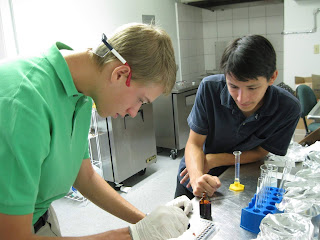 |
| Tropical colors never fail to make the picture pop |
Alright, this one’s on everyone’s favorite topic: food! One of the first questions I had when I started to pack for Papua was what would I be able to find to eat once I got here. With the help of folks with present and past experience living in Doyo Baru, I was able to form a bit of the picture in advance of what was available - lots of tofu and tempeh and soy milk, staples like oats and flour, and even the canned Chai Pow Yu gluten that I love. And of course plenty of fruits and vegetables. Rice was a given. Special things, however, I would have to bring in my suitcase, like nutritional yeast or special seasonings.
After arriving, I got a good orientation of what was currently available, as I followed Wendy Roberts around the Sentani
pasar and tagged along with Ruth Boyd to the supermarkets in Abepura. It was nice to see there were indeed quite a few ingredients to work with and I wouldn’t have to subsist on just rice and beans. (Good thing too, because the beans here don’t seem to ever get soft, however long I cook them).
Some items were missing, however. The only available bread was white bread with milk in it; I eat wholewheat bread and I’m a vegan. Apart from sesame, any other kind of seeds—pumpkin, sunflower, chia, flax—had to be special-ordered from Jakarta. There were no sugar-free fruit spreads, just very sweet pineapple and strawberry jam. And of course any kind of vegan substitute bread spread like margarine or mayo was nowhere on this side of Indonesia.
Bread is important to me, so I got to work on that early on. I immediately ran into a problem, however, as I couldn’t seem to find bread pans anywhere. That was one thing I hadn’t thought of bringing in my three (yes three) suitcases, and now I was discovering that most things related to baking simply weren’t sold around here. I managed to find a couple sets of measuring cups, but no cookie sheets or measuring spoons. Wendy bailed me out by giving me a couple bead pans she wasn’t using anymore. I breathed a sigh of relief when I was able to start turning out loaves (some more successful than others) of bread. Eating rice three times a day is stretching it a bit for me, but when I saw I was able to make bread, I decided I was going to be able to survive! Since then, Barokah Bakery has opened up and I can buy wheat bread from them, making it a lot more convenient.
I would say that the supermarket experience here is a mix of being able to find the everyday fare you would expect in a Safeway or Grocery Outlet—pasta, canned vegetables, flour, sugar, corn flakes—and wistfully wishing there were specialty items items like tahini, sunflower butter, crackers without milk in them, tortilla chips without milk or MSG in them, or even simple things like apple juice without added sugar. The couple times I’ve traveled out of Indonesia this last year, I’ve eagerly devoured all the things I can’t get here, and even brought back a suitcase-full of food from Lebanon!
But, despite the reality that this island doesn't have many of the things I'd taken for granted back home, I must say I certainly haven’t landed in a desert. There's a good deal available, and I'm told that a lot more products have been showing up on the shelves lately, compared to just a few years ago. So it's quite doable to make a good variety of tasty dishes.
 |
| No berries for sale around here - so what is it? |
As an American with European influence (or the other way round), I tend to like to eat traditional Western-type breakfasts, hot food for lunch, and bread for supper. So for morning menu items, I’ve enjoyed tropical smoothies with homemade granola or corn flakes, potatoes and tofu, pancakes, muesli, and of course the reliable standby of oatmeal. I even occasionally make grits with the corn meal that Barokah Bakery grinds.
Vegan spreads are hard to come by, but with some creativity I’ve been able to make some homemade spreads that do the trick. I was very happy to learn of one store that usually stocks garbanzo beans, so I pick up a couple cans every now and then and make hummus, sometimes using toasted sesame seeds if I’ve run out of tahini that I’ve packed in. Eggplant is super cheap here, and as I write I can smell the aroma of roasting eggplant as I get ready to make some baba ganoush.
Lately I’ve also been experimenting with aquafaba (a fancy name for the water from the chickpea can) and I was amazed the first time I tried to make a vegan mayo spread with this magical ingredient. I’ve tried blending oil slowly into lemon juice and vinegar and water before, but of course it always just turns into salad dressing. But this time when I drizzled the vegetable oil into the chickpea water that was swirling in the blender, something remarkable happened and the whole lot just stiffened up like cream! Refrigeration made it even firmer and I was delighted to discover I could make something that was something similar to my sorely missed Vegenaise from the U.S.!
 |
| There's a good reason why I eat rice for lunch everyday! |
Now I have to say, my mealtimes don’t consist completely of just Western food. Actually I eat Indonesian food for lunch everyday! Since I thought I’d be pretty busy with flying, I started paying Ida, the wife of one of our maintenance staff, to cook lunch for me. The result is that I get the best of both worlds, and I’ve been enjoying many delicious vegetarian Indonesian-style dishes, from stir fries, to pumpkin sauce, to sweet potato greens in coconut milk, and of course always some kind of tofu or tempeh. The only downside is that I haven’t really learned how to make Indonesian food myself yet! I’ll have to take some lessons from Ida at some point before I leave.
Actually, it’s funny because not having to cook means that I can do it as a pastime now. Often I’ll try experimenting on the weekends during my time off. My housemates are always happy to try whatever comes out of the oven or off the stove - banana muffins, dragonfruit crisp, biryani, spring rolls, or one of Choqky’s favorites: oatmeal raisin cookies. Are you getting hungry yet? I’m afraid I am, and I’ve already had supper!
 |
| Meet my Mauritian roots |
Ok, so the goal of this blog post wasn’t to show off or send you wandering to the fridge, but to simply let you in on what this expat’s everyday eating experience is like. And also show how it’s possible to be vegan and still enjoy good food.
Of course, some of you might be wondering, why am I vegan in the first place? And why continue to bother when it would be easier to just contextualize and eat what most everyone else in my host culture consumes? The answer to the first question is that’s how I was raised. So, true, my eating habits were largely the product of my upbringing. But the reason I’ve continued to stick with it into adulthood is because of a book I read a couple years ago called
The China Study. Although I’d heard it cited many times, I never actually knew what was in it, so one day I picked the book up out of curiosity and decided to read it through myself. That did the trick of cementing in my mind why I want to continue to be plant-based. The
science was very striking, and ongoing research—like the
Adventist Health Study on America’s longest-living people group—continues to support Dr. Campbell’s findings that plants have protective properties, while foods, and in particular proteins, from animal sources have a cancer/diabetes/heart-disease promoting effect.
Apart from the physical benefits of being plant-based, there’s also reason to believe there are mental performance
benefits too, as my classmate explains in this article. The modern research is certainly backing up what is likely the
oldest clinical trial on record.
Alright, this wasn’t meant to turn into a research paper either. But despite the fact I can’t send you any real samples to try, I hope you’ve enjoyed this gastronomical read. And at the least, perhaps I’ve been able to provide some food for thought.
































